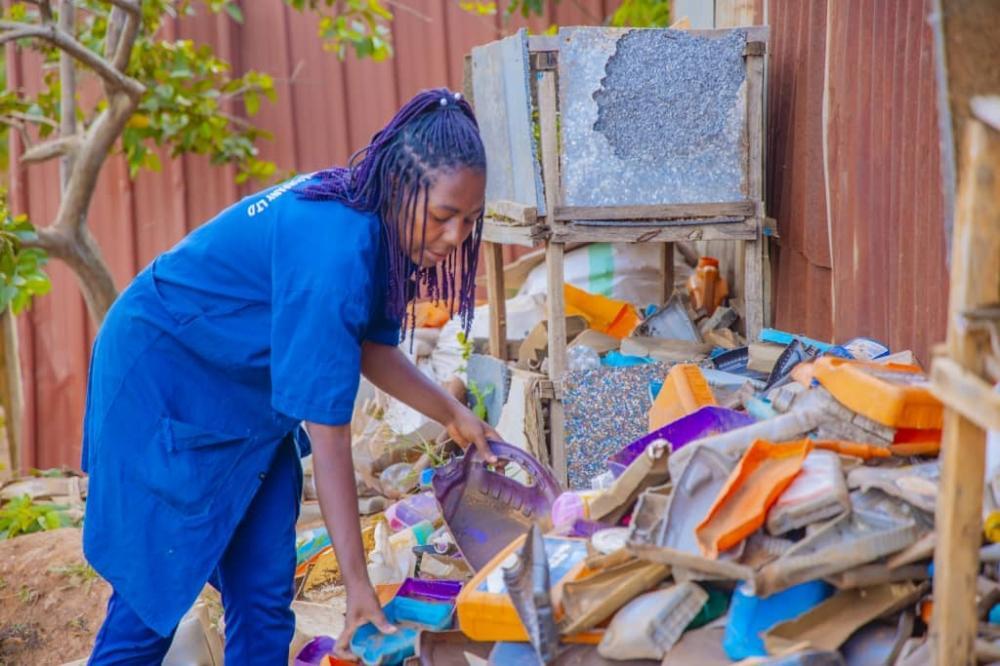Africa-Press – Rwanda. Rwanda has emerged as one of the leaders in combating plastic pollution, implementing groundbreaking initiatives that transform waste into valuable resources.
With over 400 million tonnes of plastic produced annually worldwide, according to the United Nations, and less than 10% recycled, Rwanda’s proactive measures offer a model for sustainable development.
The UN estimates that each person on the planet consumes more than 50,000 plastic particles per year –and many more if inhalation is considered. According to the UN, discarded or burnt single-use plastic harms human health and biodiversity and pollutes every ecosystem from mountain tops to the ocean floor.
This explains pretty much why Rwanda which joined the rest of the world, on June 5, to celebrate World Environment Day 2025 under the theme: Beat Plastic Pollution, banned plastic carry-bags in 2003, and single-use plastic items in 2019.
However, some plastics were given the green light due to the lack of alternatives.
More than 14 companies are now producing alternative packaging to non-biodegradable plastics, while over 15 are involved in plastic recycling, according to Rwanda Environment Management Authority (REMA). Here, we look at six innovative solutions geared towards tackling the problem of plastic waste in Rwanda.
1. Eco-friendly bricks and pavers from plastic waste
Depot Kalisimbi Ltd, a licensed waste management company, has pioneered the recycling of plastic waste into construction materials.
In 2023, over 2,000 tonnes of plastic were repurposed into flexible materials such as pavers and bricks. This initiative not only reduces plastic waste but also supports sustainable building practices.
Pascal Gatete, the Chief Executive Officer of Depot Kalisimbi Ltd, told The New Times that: “This initiative marks a key milestone in sustainable engineering, serving as proof of the concept for the use of recycled materials in large-scale construction projects.
“With its success, we plan to scale up the project to extend the use of plastic pavers in other facilities and community roads further advancing our mission of waste valorisation.”
Waste valorisation, or waste reclamation or beneficial reuse, is the process of transforming waste materials into valuable products or resources. Waste valorisation involves repurposing waste streams through methods like recycling, composting, or conversion into energy or materials. Basically, the process is about minimizing waste disposal by finding useful applications for materials that would otherwise be discarded.
2. Recycled plastic furniture and decorations
SIBO Engineering Company, founded by Beathe Siborurema, has developed a process to recycle plastics into stylish furniture and decorative items.
Starting with 100 kilograms of plastic per month, the company now recycles 750 kilograms monthly, providing eco-friendly alternatives to traditional furnishings.
Siborurema said: “We started four years ago as a start-up. We by started recycling 100 kilogrammes of plastics per month. Currently, we can recycle 750 kilogrammes.
“We have five permanent workers and 12 casual workers. We still need financial capacity to buy improved equipment.”
3. Plastic waste transformed into floor tiles
Entrepreneurs in Rwanda are converting plastic waste into durable floor tiles.
These recycled tiles offer an affordable and sustainable option for construction projects, contributing to the reduction of plastic pollution.
“We are producing 50 big floor tiles and 70 small tiles per day,” Siborurema added.
Floor tiles made from recycled plastic are a growing trend in sustainable construction and design.
4. Recycled plastic sheeting for construction
Soft Packaging Ltd, another local company, developed a process to recycle plastics into black plastic sheeting used in construction.
By sourcing waste plastics from various locations, the company produces up to 6 tonnes of sheeting daily, supporting the construction industry with sustainable materials.
Nitesh Patel, the General Manager of Soft Packaging Ltd, said: “We bring in waste plastic materials from outside sources. Collection points include airports and border areas. Once the material arrives, we sort the plastic here on-site. Some plastics are clean and ready to be sorted directly.
“Dirty plastics need to be washed and cleaned thoroughly before processing. After cleaning, the material is sent to the extrusion site for further processing. Our daily production capacity is around 4 to 6 tonnes per day.”
5. Plant bags for seedlings from recycled plastics
Investors in Rwanda are producing plant bags from recycled plastics, supporting the agriculture and forestry sectors.
These bags provide an eco-friendly solution for growing seedlings, promoting sustainable agricultural practices.
6. Home compostable packaging
Arth Biobag, another company based in Rwanda, manufactures certified compostable products intended to replace conventional petroleum-based plastics.
Their products, made from renewable materials like cassava, maize, and potatoes, naturally decompose in the environment without needing industrial processing.
Arth Biobag started operations in Rwanda last year.
Mirwais Salimi, the Operations Manager at Arth Biobag, said the installed production capacity is 1,200 metric tonnes of home compostable packaging per year.
“They are 100% home compostable plastics. These plastics naturally decompose in the environment without needing industrial processing. If thrown into open areas, they turn into fertiliser and enrich the soil—no extra effort needed,” he explained.
The factory uses food waste products from cassava, maize, potatoes, and others, to produce bio-compostable packaging materials.
Compostable plastics degrade into organic matter within 60 to 180 days and can be composted alongside other household waste, ultimately benefiting the soil.
For More News And Analysis About Rwanda Follow Africa-Press






